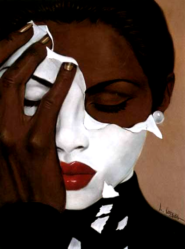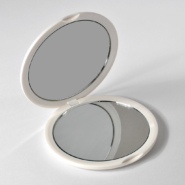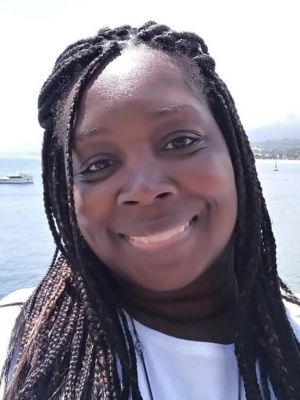Double Vision
“Who sees the human face correctly: the photographer, the mirror, or the painter?”
Pablo Picasso
The mirror may be a simple tool of glass and metal, but its simplicity belies its true magic: reflection. That reflection has the power to project, distort, and reveal multiple realities. And it is only through reflection that I came to understand that power lies not only in the mirror, but also in me.
Invulnerable (Childhood, 1970s and 1980s)
 My parents didn’t know what they had gotten themselves into when they had me. Family legend has it that, shortly after learning to talk, I attempted to blackmail my own mother with threats of calling her boss if she didn’t acquiesce to my orders. At three years old, I went from an only child to a big sister. When my parents came home with my new baby brother, I marched up the stairs to their bedroom, planted my hands on my hips, and demanded of my mother, “When are you going to get out of the bed with that baby?” The Boss Baby had nothing on me.
My parents didn’t know what they had gotten themselves into when they had me. Family legend has it that, shortly after learning to talk, I attempted to blackmail my own mother with threats of calling her boss if she didn’t acquiesce to my orders. At three years old, I went from an only child to a big sister. When my parents came home with my new baby brother, I marched up the stairs to their bedroom, planted my hands on my hips, and demanded of my mother, “When are you going to get out of the bed with that baby?” The Boss Baby had nothing on me.
“There is only one mirror, the mirror inside. Everything you see on the outside is a reflection of what is going on in your mind.” Victoria Grant
By fifth grade, I had started a gang. To be fair, it was a pretty nerdy gang, but we could hold our own. Bullies from another part of our working-class neighborhood regularly showed up and harassed the kids on our street, sometimes stealing or breaking our toys. Something had to be done, so I created membership cards using the leftover cardboard inserts from my mom’s pantyhose. Every week, I gathered the neighborhood kids on the front stoop and taught them everything I learned in my martial arts class. We called ourselves the Monitory Defense Team. After a few run-ins, word got around that the kids on Hillcrest and North Atlantic fought back, and that maybe they should find someone else to pick on.
* * *
Despite my family’s education, we were barely middle class. My brothers and I weren’t spoiled, yet we never went without our basic needs. And when our neighborhood was overtaken by the drug and gang wave that hit many inner cities in the 1990s, my family had the means to leave for a nicer home in a safer area. I lived a charmed life, I suppose, with a close-knit family, plenty of friends, good grades, awards, recognition, and eventually professional success.
Charmed or not, when I looked in the mirror, I just saw a regular person. A teenager who suffered from the same angst as any other adolescent. A girl whose 80s fashion choices—and later on, her dating choices—didn’t always reflect the best judgment. A young woman who wasn’t very forgiving of those questionable choices.
It didn’t occur to me that there was a disconnect between what I saw in the mirror and the image I projected, but there were clues: The college acquaintance who expressed relief that my perpetually chapped lips meant maybe I was not as perfect as I appeared. The person who repeatedly brought up a mistake I made—and apologized for—because he didn’t think I seemed “sorry enough.” The entrepreneurial coach who responded harshly when I expressed disappointment about the sluggish growth of my consulting business.
When I looked in the mirror, I just saw a regular person. A teenager who suffered from the same angst as any other adolescent.
Clearly, the flawed, sensitive person who looked back at me from the mirror was not how others viewed me. My dad said I shouldn’t be surprised that some people saw me as invulnerable or perfectionistic. It seems I’ve been cultivating that cool exterior since birth.
Sexy (College, 1990s)
I stared into the bathroom mirror, trying to see what he saw when he looked at me. Earlier in the day a good-looking guy on campus had called me sexy and offered me a ride, wherever I wanted to go, in his champagne-colored convertible. His attraction confused me because I didn’t think of myself as sexy. My reaction confused him when his compliment made me noticeably uncomfortable. Surely, he must have thought, a woman built like that was a flirt, confident in the power of her feminine wiles. But sexy was some other girl. I was “the smart one” or “the funny one.”
Even under close examination, my reflection didn’t budge.
* * *
Self-image is a funny thing. No matter how skinny she is and how many people tell her so, someone with body dysmorphia still sees herself as too fat. Someone who spent most of his life morbidly obese may still identify as such even years after shedding sixty percent of his body weight. And for many years, no matter how often men hit on me or how hard I stared at myself, I couldn’t see what they saw as physically attractive about me.
“Looking in the mirror is very strange; we see only what we choose to see, good or bad.” Bonnie Langford
I am a woman of tall stature; 5’10” to be exact. For much of my life people asked me if I was a model or a basketball player, though childbirth and the slowing metabolism of adulthood mean those questions don’t come so often anymore. My skin is dark brown, a hue that is in vogue now, but which invited cruel teasing when I was a child. The proverbial “girl next door” never looked like me, nor did the “all-American beauty queen.” If Black women were represented at all on television, in movies, or in other mediums during my youth, we were relegated to a few narrow stereotypes, all of them unflattering. And darker-skinned women were always portrayed as the least desirable and least attractive of the brown people, a practice which persists to this day. It’s no wonder that I developed my own form of psychological dysmorphia. Not even a magic mirror could change the fact that what I saw was not my actual reflection but the projection of my own self-image.
Inappropriate (Work, 2010s)
I perched on a chair in the empty reception area, waiting to be retrieved for my job interview. After several years as an independent consultant, I was ready to reinsert myself into the proverbial Matrix for the stability of a steady paycheck. I preened and poked at myself and tried to slow my breathing. The nearest parking garage had been closed, which forced me to park three blocks away and sprint through the rain to make it on time. I was grateful that I had chosen to wear slacks and wedges. The smartly appointed receptionist had eyed me skeptically when I walked in, communicating without words that my nappy little Afro-and-blazer-wearing-self didn’t fit in there. I felt my confidence shrink a little, but I kept my head up and a smile plastered on my face. When an assistant emerged to take me back to the interview, my effusive personality took over, and we chatted and laughed until we reached a small conference table. My flagging hope was restored. But it lasted only a moment.

“Face Reality: Female” by Laurie Cooper
The two executives could’ve been twins, from their tailored suits to the identical sticks up their asses—except that one interviewer was Black and one was White. The Black one, who was the more senior of the two, looked me up and down. He punctuated his judgment with a smirk in the direction of my designer handbag, a holdover from my corporate days. The interview went downhill from there with him interrogating me on parts of my resume as if he thought I were impersonating the individual who had accomplished those successes. His twin looked on impassively.
When I left, I felt neither invulnerable nor attractive. I felt small, unwanted. How could I have forgotten that, in the years since I’d left the rat race, I dropped my veneer of corporate appropriateness? The chemically straightened hair, the designer suits, the high heels, the shapely figure—all gone. How silly of me to think that they would see past my exterior and judge me based on my capabilities.
When I look in the mirror today, it is with double vision. I see the reflection of my evolving self-image, but I also see the selves that others impose on me. And while I am more mindful of the image I project, it still makes me uncomfortable that the perception of strangers can alter my identity without my consent.
 Part of me wishes that I could return to the naivete of obliviousness, the bubble I didn’t realize I inhabited. But with the wisdom of awareness comes the power of self-determination. I accept that others are free to perceive me as they choose, but those assumptions need not be a prison. I can be strong without having to appear perfect. I can be sexy and intelligent. And I can choose to occupy spaces where I do not have to be “appropriate” to be celebrated. And that makes my double vision a superpower.
Part of me wishes that I could return to the naivete of obliviousness, the bubble I didn’t realize I inhabited. But with the wisdom of awareness comes the power of self-determination. I accept that others are free to perceive me as they choose, but those assumptions need not be a prison. I can be strong without having to appear perfect. I can be sexy and intelligent. And I can choose to occupy spaces where I do not have to be “appropriate” to be celebrated. And that makes my double vision a superpower.
A.D. Lowman is a management professional, consultant, and community leader. Her leadership and career advice has been featured in Essence, Money, and Diversity Woman magazines. She is pursuing her MFA in Creative Writing at Antioch University Los Angeles where she serves as an Associate Managing Editor and blogger for Lunch Ticket.





